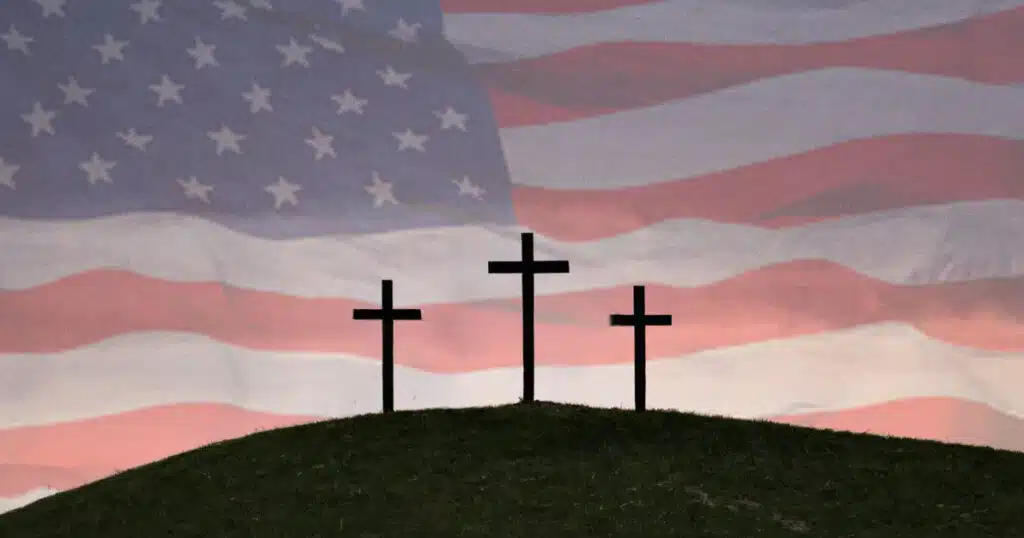
God and Faith in America
I read an interesting article this past week entitled “America Isn’t Sacred, Only God Is.” The article was written by Brian A. Graebe, a Catholic priest. The article makes the point that the frequent use by our elected leaders of godly language in civil or governmental matters is misplaced.
For example, Fr. Graebe states that President Biden used the word “sacred” four times in a recent speech, referring to the “sacred” task of “perfecting our nation,” the equally “sacred,” in Biden’s view, “cause of our country” and the “sacred” ideals of our founding documents. Graebe responded that while “the aforementioned may be important, praiseworthy and deserving of respect, none are sacred.” (Wall Street Journal, 08-02-24).
The article offers an additional, similarly erroneous example. After Jan 6th, then-House Speaker Nancy Pelosi referred to the U.S Capitol as a “temple of democracy.” Fr. Graebe points out that “a temple is a place to worship God … and while the U.S. Capitol is famous, iconic and worthy of protection and respect, it isn’t a temple and democracy isn’t a religion.” (WSJ).
The gist of his article is that “an increasingly irreligious culture seeks to appropriate the words of faith” and that is what I found interesting.
Pres. Reagan’s famous “Shining City on a Hill” remains a powerful illustration of what he believed America was, is, and could be. But the reason the illustration is such an inspiring and enduring image is not because the lofty and beautiful city was “shining … or tall, proud and built on rocks stronger than oceans,” but because God had ordained it. That is what imbued it with hope and promise.
We used to know that. We used to designate as sacred only those rarities in life that truly are.
I think of the language of George Washington’s Farewell Address to the nation:
“Of all the dispositions and habits which lead to political prosperity, religion and morality are indispensable supports. In vain would that man claim the tribute of patriotism, who should labor to subvert these great pillars of human happiness, these firmest props of the duties of men and citizens. The mere politician, equally with the pious man, ought to respect and to cherish them. … And let us with caution indulge the supposition that morality can be maintained without religion. Whatever may be conceded to the influence of refined education on minds of peculiar structure, reason and experience both forbid us to expect that national morality can prevail in exclusion of religious principle.”
I think of Thomas Jefferson in the Declaration of Independence: he states that America takes its separate and equal station in the world, to which it is entitled by “the laws of Nature and of Nature’s God.” He also emphasized our being endowed “by our Creator with certain unalienable rights.” He powerfully closes the Declaration by “appealing to the Supreme Judge of the World for the rectitude of our intentions” and does so “with a firm reliance on the protection of divine Providence.”
I think of John Adams, in his explication of public and private virtue, stating that “our constitution was made only for a moral and religious people. It is wholly inadequate to the government of any other.”
I think of Benjamin Franklin who stated: “I have lived a long time, Sir, a long time, and the longer I live, the more convincing proofs I see of this truth—that God governs in the affairs of men. And if a sparrow cannot fall to the ground without His notice, is it probable that an empire can rise without His aid?”
Throughout American history, these principles have resonated with us because we know the source from which they flow, God Almighty. If that has changed because we have drifted from these principles—and replaced them with secularism and atheism—we should recognize that drift and return to them. In fact, we must. America is unique, not sacred but we remain blessed, strong, and prosperous when we remember that God is.
As our increasingly irreligious—even anti-religious—culture mis-appropriates the symbols and the vocabulary of religion in an effort to demonstrate an alliance with a God of their own construction, which is then used to “sanctify” their political agenda by suggesting that ‘God is on their side,’ I think it’s worth remembering President Reagan’s admonition that ‘the question isn’t whether or not God is on our side. The question is whether or not we are on God’s side?



